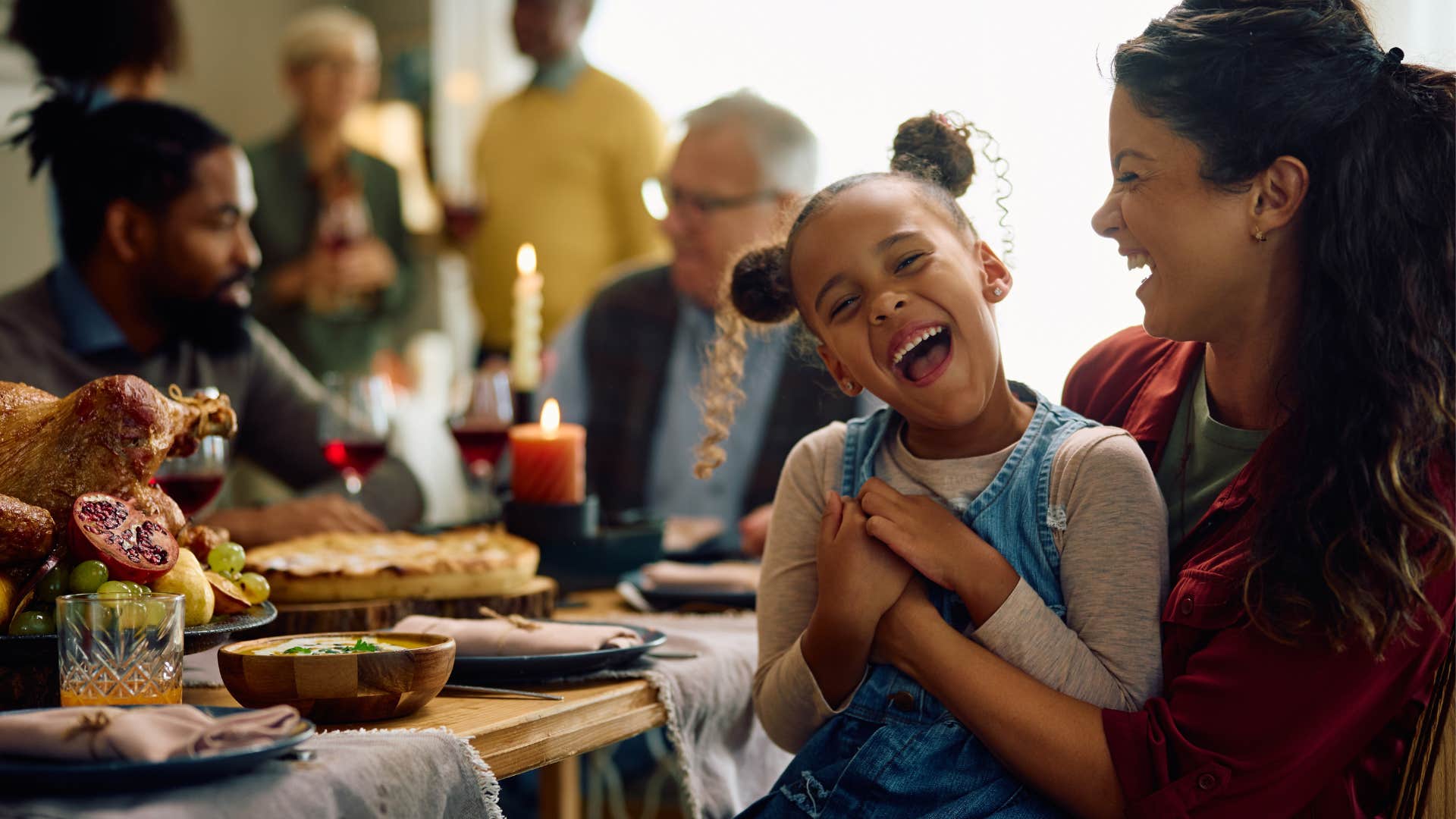12 Phrases Adult Children Don't Want To Hear From Their Parents When They're Home For The Holidays
The holidays are stressful enough without uncomfortable family arguments.
 Olha Yefimova | Shutterstock
Olha Yefimova | Shutterstock Coming home for the holidays can be equally stressful and anxiety-inducing, especially for adult children who grew up with complicated relationships with their parents or in inconsistent households. From trying to navigate uncomfortable conversations to feeling pressured to speak about politics or validate their relationship status, there are certain phrases adult children don’t want to hear from their parents when they’re home for the holidays.
Being cognizant of your adult child’s boundaries and focusing on enjoying quality time together can help to protect everyone’s sanity and peace of mind, even during the chaotic holiday season.
Here are the 12 phrases adult children don’t want to hear from their parents when they’re home for the holidays:
1.‘Why are you still single?’
 Krakenimages.com | Shutterstock.com
Krakenimages.com | Shutterstock.com
Holiday gatherings can be lonely for single adult children, especially in a family that prioritizes romantic relationships and societal expectations about marriage and appearance. They’re not only questioned about their romantic lives and endeavors, but they’re often dismissed and criticized for their status.
Adult parents should remember that if they’re commenting on their children’s marriages or relationship statuses, they’ve probably already spent a lot of time and energy worrying about it. They’re adults who can make their own decisions and find the right partner when they’re ready to — it shouldn’t be normalized as dinner conversation on a holiday.
2.‘Nobody will ever put up with that attitude’
 Voronaman | Shutterstock.com
Voronaman | Shutterstock.com
Many parents of adult children rely on passive-aggressive comments to inadvertently frustrate their kids during the holidays. Often, it’s not truly about whether or not they have a partner, successful job, or loving kids; it’s about their own insecurities that they’re projecting onto their kids.
So, when parents use a phrase like this, they’re not trying to motivate their kids to change their mindset or attitude healthily; they’re projecting their own false narratives about relationships and “manners” on their adult kids.
3.‘You’re living in a fantasy world’
 Krakenimages.com | Shutterstock.com
Krakenimages.com | Shutterstock.com
Dismissive comments like this aren’t helping anyone enjoy the holidays — so why do parents say it to their adult children? Often, comments like this are most common amongst narcissistic parents, like Charlie Health experts explain, as they’re generally less empathetic and more concerned with re-asserting their own opinions and image over others.
By attacking their children’s character, experiences, or opinions, they can create more space for asserting their own — or, at the very least, bring someone else down to assert their control and superiority over a conversation.
4.‘It was much harder back in my day’
 Wavebreakmedia | Shutterstock.com
Wavebreakmedia | Shutterstock.com
Around 18% of parents label their relationship with young adult children as average or poor, according to a Pew Research Center study, often stemming from disagreements, unmet emotional needs and expectations, and general disconnect. When parents make comments like this to their adult children, they not only spark resentment that’s attributed to a toxic relationship, but they dismiss their children’s emotions and experiences.
If your adult child is struggling and feels comfortable enough to express that to you or your family, especially over the holidays, take the time to listen and support them, even if you don’t agree with their situation or have struggled more in your own life.
You can’t compare the current generation of adults to those from 50 years ago — it’s not only unfair, as our world continues to shift and change, it’s ignorant and dismissive.
5.‘Your generation is just immature’
 Perfect Wave | Shutterstock.com
Perfect Wave | Shutterstock.com
Even though they’re adults, many parents struggle with seeing their kids in their new, grown, and mature identities and often urge them to fall back into old habits with hurtful comments and dismissive behaviors. Over the holidays, an inherently chaotic and stressful time, parents may fall into that mindset more often, criticizing their adult kids for their perceived immaturity.
6.‘Why don’t you come home more often?’
 Face Stock | Shutterstock.com
Face Stock | Shutterstock.com
Parents who guilt their adult children into coming home more often aren’t sparking the favorable emotions they think they are. Instead, they’re only further widening the gap in their relationships. According to family therapist Sarah Epstein, many parents rely on guilting their kids over their fears that they’re being removed from their lives — which is, more often than not, completely misguided.
Adult children are building their own lives, experimenting with independence, and investing in new relationships—they’re not actively ignoring you. Instead of trying to pass off your uncomfortable emotions onto your adult children by shaming them into spending time with you, work on cultivating a loving and welcoming home environment that they look forward to coming home to.
By nurturing your relationship when you’re together, living in the present moment, and making “home” a safe and nonjudgemental place for them to come, they’ll be more willing to fall into the habit of more frequent visits without being guilt-tripped into it.
7.‘Why aren’t you more like your siblings’
 Fizkes | Shutterstock.com
Fizkes | Shutterstock.com
Comparison culture affects us all — regardless of family dynamic, age, gender, or status. We’re all innately drawn to comparing ourselves to others, from appearance to intellect. However, setting a healthy boundary between healthy competition and anxiety-inducing comparison is necessary, and sometimes, parents get that balance wrong with their adult children.
Pitting two siblings against each other only sparks resentment and taints a perfectly healthy family dynamic. Your children are adults capable of making their own decisions and coming to you for advice if needed. So, don’t offer unprompted advice; don’t expect your adult kids to be receptive to misguided motivation fueled by comparison.
8.'Are you going to eat all that?’
 Drazen Zigic | Shutterstock.com
Drazen Zigic | Shutterstock.com
While they might be relatively well-intentioned, many parents do more food policing and weight shaming than they realize by promoting certain food habits and eating tendencies, according to University of Utah Health experts. As a kid, this can manifest as a pressure to finish a meal, even after you’ve reached fullness. In adulthood, using a phrase like this could be more outwardly critical.
If you're a parent hosting your family for the holidays, remember that your kids are adults. They can make their own choices, not just because they know themselves and their bodies better than anyone but also because they’re grown enough to deal with the consequences of making the wrong ones.
9.‘You’re so dramatic’
 Krakenimages.com | Shutterstock.com
Krakenimages.com | Shutterstock.com
Even for adult children who come to family holidays with the best tools to protect their emotional health, often they’re riddled with disappointment when their parents overstep their boundaries, or they feel disrespected. Parents who dismiss their adult children’s feelings aren’t just sparking resentment in a passing moment, they’re pulling at unresolved trauma and unmet emotional needs from their childhood, too, like psychologist Hal Shorey explains.
If your adult child acknowledges that something you said hurt their feelings, apologize and move on. If you try to dismiss a child’s concerns or shift blame away from yourself, you’re only adding to the resentment and mistrust fueling your tumultuous relationship.
Even though younger generations like Gen Z and millennials grew up online, where they had more exposure to emotional regulation tools and tips for setting boundaries, Gen X and baby boomer parents still have the opportunity to hear out their children’s concerns and emotions, even if they don’t entirely agree or understand.
10.‘You look so different’
 ViDI Studio | Shutterstock.com
ViDI Studio | Shutterstock.com
Typically, everyone should avoid commenting on someone else’s appearance, body, or weight — whether you’re meeting an old friend, visiting your parents, or home for the holidays. While it might’ve been expected for a parent to comment or criticize their kids’ appearance in their youth, doing the same towards adult children is not just intrusive but tends to feel disrespectful and toxic, as well.
According to a 2020 youth study, body image already ranks highly among concerns for young adults. They don’t need a well-intentioned comment to feed their ego, especially from parents who likely cultivated their insecurities from a young age.
11.‘This is the most exciting time of your life’
 impact photography | Shutterstock.com
impact photography | Shutterstock.com
Whether you’re in your twenties post-grad, navigating life with a toddler, or in a new relationship around the holidays, you’ve probably heard this phrase from a family member at a Thanksgiving dinner or Christmas party. Not only does it feel dismissive to people struggling in their current life stage, but it also promotes a strange and misguided idea that we’re all supposed to be happy and prosperous all the time — or at least trying to paint a misguided picture to everyone else that we are.
This narrative largely contributes to the loneliness epidemic so many of us are experiencing. As a Gallup survey explains, today, we’re missing out on intentional and vulnerable social connections, even when seated around a table with our families for the holidays.
12.‘What do your tattoos really mean’
 Fizkes | Shutterstock.com
Fizkes | Shutterstock.com
While ignoring a grandmother’s side-eye stares from across the table on Thanksgiving might be impossible, parents and other family members can be more conscious of asking questions like this. Compromise and unconditional support are virtues in families — you don’t have to express your disagreement with something to get along.
If you don’t like tattoos and wouldn’t get one, more power to you! However, making passing comments like this or weird suggestions that your kids “ruined their bodies” with tattoos only sparks resentment and frustration that’s wholly unnecessary.
Zayda Slabbekoorn is a staff writer with a bachelor’s degree in social relations & policy and gender studies who focuses on psychology, relationships, self-help, and human interest stories.

